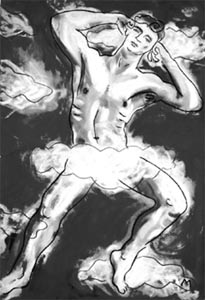![[Metroactive Features]](/features/gifs/feat468.gif)
[ Features Index | Metro | Metroactive Central | Archives ]
Tele-Your-Story
By Traci Hukill
'Hello, who's just joined us?" "Uh, I have," I answer into the receiver with great poise. "I can't tell who 'I' is," says the instructor."What's your name?" I give my name and take the teleclassroom equivalent of a seat in the back row, keeping mum for the rest of class. Other students straggle in behind me, telephonically speaking, their arrival announced by a short ring and a pickup. Within minutes 20 students from all over the country are connected by phone bridge for a free introductory class at Coach University, a virtual institution dedicated to swelling the ranks of coaches.
If coaching itself doesn't set off the skeptics' internal alarms, Coach University might. Its $3,000 two-year program is conducted almost exclusively by telephone, email and fax. Coach University is, to say the least, a potent presence in the field of coaching; more than half the coaches I've met are Coach University grads. I'm here to assess in a highly scientific manner whether the teleclassroom is a scam or an undiscovered jewel.
So far I'm having fun making up faces to go with names as people join the bridge. I'm pretty certain, for example, that Rhoda from Florida has a red beehive. I can hear it in her brassy drawl. Gene from Atlanta must drive a pickup! And Andrew from San Francisco is probably wearing a turtleneck and expensive glasses this very moment.
Bill Thomas, our instructor in San Antonio, asks us to keep our receivers on mute except when talking in order to shut out ambient noise. This turns out to be a fine idea; during class I walk around the house, stir the beans, make rice and--what the hell--tinkle. No one's the wiser. And I haven't missed a thing.
Thomas introduces himself as a former hospital administrator who's been a coach for five years. He asks each of us to "laser" an introduction of ourselves (that's coachese for "spit it out"). Several social workers, consultants and therapists are among us. Some mention they're fed up with playing the insurance game in their practices. Thomas assures us that coaches don't have to hassle with such minutiae, since insurance doesn't cover coaching.
Class starts predictably enough with Thomas asking us to define coaching. At first no one answers, then hesitant guesses come in, prefaced by the required intro: "This is Julia. Helping people find their way?" "It's Michael. Helping people get organized."
Eventually Thomas gives us his own working definition.
"For me," he says, "a coach is an objective partner who provides feedback and doesn't judge."
We go on to establish the distinctions (a very popular term among coaches) among coaching, consulting and therapy. We learn that the first three steps of coaching are listening, evoking and clarification. The eight or nine people who have already established themselves as the good students are tentatively discussing these notions when Fred from Boston stumbles into the classroom.
"Ah, I'm here for Orientation?"
"You're a little early, Fred," Thomas says. "You can take a place on the sidelines and wait if you like." Fred's response is to hang up. Thomas wraps up class and bids us farewell until next week at 9pm EST, when the second of our four free introductory classes takes place.
So, scam or jewel? It's a little hard to say from one class. Some transfer of knowledge took place. Several of my classmates would probably already make good coaches. But I don't care how many teleclasses and downloadable Internet exams some of the others take: they'll never see $150 of my money.
[ San Jose | Metroactive Central | Archives ]
![]()
 A new generation of personal coaches conducts nationwide 'class' by conference call
A new generation of personal coaches conducts nationwide 'class' by conference call
From the January 7-13, 1999 issue of Metro.